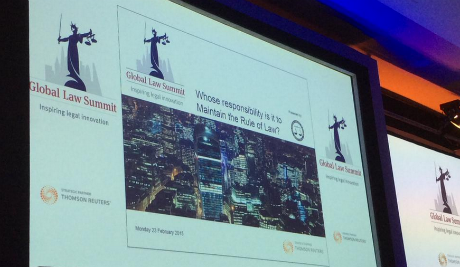This year of 2015, we celebrate the 800th anniversary of one of the founding documents of English law, the Magna Carta. This was agreed between King John and his rebel barons in 1215. And actually one of the prominent barons at that time was Prince Louis, who went on to be King Louis VIII of France.
Written version (continued)
And at that time, Magna Carta was written in Latin, but it was translated first into Norman French long before it was translated into English.
This text sets out four conditions which remain fundamental to this day: power should not be exercised in an arbitrary way; all citizens are equal in front of the law; a nation is responsible to its citizens; and there should be due process of law.
In fact, these principles are a good summary of what we mean even to this day by “the rule of law”, and they have been picked up in innumerable constitutions, texts around the world, they are the basis of all the major conventions dealing with human rights.
So this is an inheritance that is worth celebrating, and in London this week we are holding a big Global Law Summit with Ministers of Justice, judges, lawyers, experts on the subject. And I’m delighted that Madame Christiane Taubira, the Minister of Justice for France, will be participating in these meetings.
They’re going to be looking at all the major issues that confront the judicial authorities around the world, issues like modern slavery or the fight against terrorism. Between the UK and France, we have a really good cooperation in all these areas. Organised crime for example is something that we work on every day, using the principles set out in the Magna Carta.
By doing that we can ensure both that citizens are free to circulate between our countries but also that our national boundaries do not become some sort of obstacle to following up legal issues and dealing with crime. So this week we’re celebrating a document that is 800 years old but still remains very relevant to our modern world.

